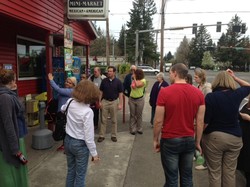Rockwood is one of the most diverse communities in the state of Oregon, with a mix of Latino, Burmese, and other Asian and African cultures. More than 50 different languages are spoken in the schools alone. How does a community with such a diverse background live and grow together? For Ecumenical Ministries of Oregon (EMO), building a thriving economic and healthy community is a challenge.
The Presbyterian Hunger Program’s Advisory Committee recently met in Portland and took time to visit the Rockwood community and hear from its interfaith partners on efforts to turn the community around. PHP is contributing to the community’s efforts to become self-sustaining.
“Our focus is people with low incomes. We want to provide economic and healthy food opportunities for residents in this neighborhood,” says Jenny Holmes, director of Environmental Ministries with EMO. “We don’t want to see people move out of the community; we’re working to provide jobs here, close to home.”
Working with local residents and community leaders, EMO launched an initiative in 2012 to assess the community on a broad range of food and economic issues and recommend action to engage citizens. More than 200 surveys were conducted in both Spanish and English. Survey teams went door to door and conducted community forums to share results.
The survey found that more than 43 percent of respondents cite transportation as a challenge. A light rail system runs east and west through Rockwood, shuttling residents to and from work as well as the nearest grocery store six miles away. With no north and south connections, the rail makes it difficult to develop local businesses to sell locally grown goods, giving residents very few options to buy local.
“This has become a challenging job,” says Maribel Gomez, a community consultant. “Unions want to develop projects that will remain in Rockwood, but people are moving out of the community because there are no jobs.”
The survey also found that 56 percent of respondents sometimes shop at a farmers’ market or farm stand, and 16 percent grow their own food. A majority of those surveyed said they have a hard time stretching their food budget to the end of the month, and at least 36 percent don’t know where to go for emergency food needs when their food runs out. Nearly all of those surveyed would like better access to healthy food in the neighborhood.
Realizing the need to bring the diverse groups together, Gomez found a church for interested residents to meet and discuss issues around health, children, fresh food, and jobs.
“No one wants to hear outsiders share ideas. The people here want and need to be self-sustainable, whether in caring for their children or raising and selling healthy food,” says Gomez. “The people need to own it and raise a level of integrity that their opinions matter.”
There is a growing interest in developing farm and garden opportunities for Rockwood residents. Holmes said there are numerous vacant lots that could be used for small community gardens and some churches are offering opportunities to create local food production.
“Seeing the eager face of a child running into the garden to look for new things is a joy that has changed a section of Rockwood. PHP is pleased to support and highlight the incredible work by Ecumenical Ministries of Oregon, who believe in a community’s ability to strengthen its own local food program,” says Ruth Farrell, coordinator for the Presbyterian Hunger Program. “With multiple languages spoken in the area, farmers, small store owners, consumers, and children all win with healthy food and relationships with one another.”

